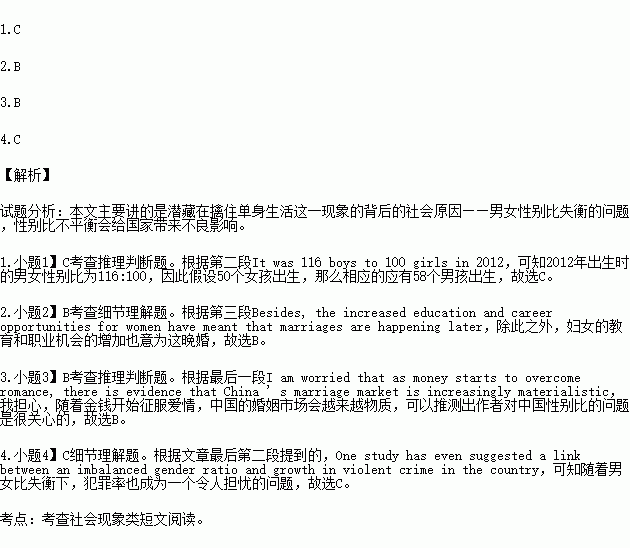题目内容
Singles' Day ---- the Chinese opposite of Valentine’s Day has turned into a massive online shopping event. It is a day when single people are supposed to buy themselves presents. But there are sociological reasons behind China's “celebration” of single life. And the imbalance could have big consequences for the country.
There were 34 million more men than women in China in 2011. Part of that is natural – usually there are 105 boys born for every 100 girls. But the Chinese gender ratio (性别比例) at birth is much more obvious. It was 116 boys to 100 girls in 2012. The one child policy is largely to blame. Brought in to limit population expansion, the policy allows only one child per family. But because male children are seen as more valuable, as well as more likely to support their parents in old age, some parents choose to have a son over a daughter. The result is that large numbers of men will likely never get married. In fact, one study has predicted that by 2030, 1 in 5 Chinese men in their 30s will never have married, while another states that 94% of unmarried people in China are men.
Traditionally, China h as seen high levels of marriage, usually among the young. Besides, the increased education and career opportunities for women have meant that marriages are happening later. It is also traditional that women often marry men of a higher socioeconomic status than themselves. So women at the top and men at the bottom find themselves alone. One study has even suggested a link between an imbalanced gender ratio and growth in violent crime in the country.
Singles’ Day can’t solve all the problems China’s singles face. Indeed, it is possible that it is causing even more problems, as men resort to increasingly risky lines of work to increase their chances of gaining money and thus a wife. I am worried that as money starts to overcome romance, there is evidence that China ' s marriage market is increasingly materialistic.
1.In 2012, if 50 girls were born, how many boys were probably born?
A. 50. B. 52. C. 58. D. 60.
2.What made women in China get married late?
in China get married late?
A. Their support of the government’s late marriage policy.
B. Their higher education level and more work chances.
C. That they expect to enjoy their single time when young.
D. That there are too many excellent young men to choose from.
3.What’s the writer’s attitude to the imbalance gender ratio in China?
A. Optimistic B. Concerned
C. Indifferent D. Unknown
4.We can learn from the passage that .
A. Singles' Day is celebrated all over the world.
B. by 2030, 1 in 5 Chinese women in their 30s will be out of marriage.
C. an imbalanced gender ratio is related to the growth in violent crime.
D. Singles' Day will solve all the problems China’s singles face.
 天天向上一本好卷系列答案
天天向上一本好卷系列答案 小学生10分钟应用题系列答案
小学生10分钟应用题系列答案
